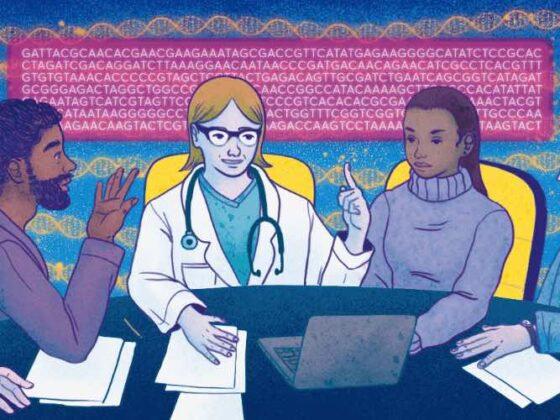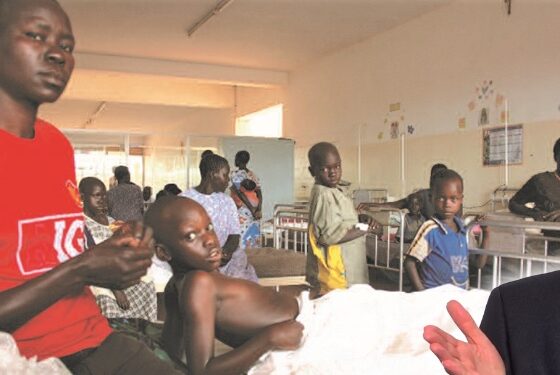In advanced melanoma, adding a personalised mRNA-based vaccine to the immune checkpoint inhibitor pembrolizumab improved recurrence-free survival compared with pembrolizumab alone. The KEYNOTE-942 study (presentation number CT001), presented at the AACR (American Association for Cancer Research)
Annual Meeting 2023, held April 14-19, found that adding the personalised vaccine mRNA-4157/V940 resulted in a 44% reduction in risk of recurrence. A subset analysis (presentation number CT224), found that the vaccine–pembrolizumab combination led to similar reductions in recurrence risk regardless of whether patients had high or low tumour mutational burden.
“For the first time in a randomised study with a control arm, the addition of an mRNA neoantigen vaccine appeared to augment the benefit of PD-1 blockade, without adding significant high-grade toxicity,” said study presenter Jeffrey Weber, from NYU Grossman School of Medicine. “This study is extraordinarily important because it gives hope that this novel strategy will provide clinical benefit.”
Vaccine strategies over the last 25 years attempted to induce immune responses against tumour-associated antigens that were not specific to the patient’s tumour. More recently, cancer vaccines have focused on targeting neoantigens bespoke for individual patient’s cancer cells. The current RNA-4157/V940 vaccine consists of a nanoparticle-encapsulated mRNA molecule encoding up to 34 patient-specific tumour neoantigens, based on the patient’s unique mutational signature tumour DNA.
The therapeutic strategy, explained Weber, first involves biopsying patients, then tumour and normal tissue from the patient are subjected to next generation sequencing. The resulting data, including the DNA, tumour RNA and HLA (human leukocyte antigen) subtype are entered into computerised algorithms, which recommend the most potentially effective immunogenic neoepitopes – the peptides that could potentially bind to MHC (major histocompatibility complex) class 1 or class 2 molecules expressed by that patient. Finally, the neoantigens are assembled into a single messenger RNA molecule that is made into a microencapsulated vaccine. The entire process takes six to seven weeks.
In the phase IIb study, following surgical resection, 157 patients with stage III/IV melanoma were randomly assigned 2:1 to receive mRNa-4157/V940 combined with pembrolizumab (n=107) or pembrolizumab alone (n=50). The vaccine was administered intramuscularly every three weeks for a total of nine doses, and pembrolizumab intravenously every three weeks for up to 18 cycles.
Results at 18 months showed recurrence-free survival (RFS) was 78.6% in the combination arm vs 62.2% in the pembrolizumab only arm (HR=0.561; 95%CI 0.309–1.017; one-sided P-value of 0.0266).
The number of patients showing treatment-related grade ≥3 adverse events was 25% in the combination arm vs 18% for the pembrolizumab only arm. The most common mRNA-4147/V940 related grade 3 events were fatigue (69.2%), diarrhoea (29.8%) and pruritus (28.8%). “Interestingly you have a slightly increased number of immune related adverse events in the pembrolizumab arm versus the combo arm, and slightly more serious adverse events with combo versus pembrolizumab,” commented Weber.
In an additional analysis of KEYNOTE-942, baseline biopsies from trial participants were assessed for the relationship between tumour mutational burden (TMB) and RFS across study arms, with the TMB-high threshold defined as 10 mutations per megabase. “We focused on the TMB because it has been shown to be a predictor of response to immune checkpoint inhibitor therapy and is relevant to a neoantigen vaccine product – theoretically, if you have a higher TMB, there will be more neoepitopes to target,” said Ryan Sullivan, the presenter of the subset analysis, from Harvard Medical School.
Results showed that, in comparison with the control arm, the vaccine–pembrolizumab combination led to a 35% reduction of the risk of recurrence or death in patients with high TMB and a 41% reduction for patients with low TMB. “Patients who were treated with the combination of vaccine and pembrolizumab had better outcomes than those treated with just pembrolizumab, independent of their TMB,” said Sullivan. “There likely is a certain TMB threshold below which our ability to successfully create a neoantigen vaccine is reduced, but our findings indicate that, above that threshold, the benefit of adding vaccination to pembrolizumab was similar regardless of the TMB.”
The biggest limitation of the study is the need for large amounts of tumour tissue, with patients with stage 2 and 3 melanoma having too little tissue for whole exome and RNA sequencing. The 34 neo antigen limit relates to size of mRNA molecules and their ability to be folded within the nanoparticle encapsulation complex. “There’s no reason why you couldn’t redesign the RNA molecule to have more neo antigens, but it only takes one,” said Weber.
A phase III study of mRNA-4157/V940 in patients with stage III/IV resected melanoma is scheduled to start summer 2023. The vaccine combination strategy, said Weber, should be applicable to any tumour that is operable, sensitive to PD-1 blockade and generates neoantigens, such as non-small cell lung cancer (NSCLC), hepatocellular carcinoma, and triple negative breast cancer. Regarding haematological malignancies, he added, they tend to have fewer single nucleotide variants. “But I see no reason why you couldn’t pursue that strategy as long as you have a good algorithm for choosing the best neoantigen.” In prostate and pancreatic cancer, where PD-1 blockade has limited activity, Weber suggested that there may be potential to use the vaccine alone.












